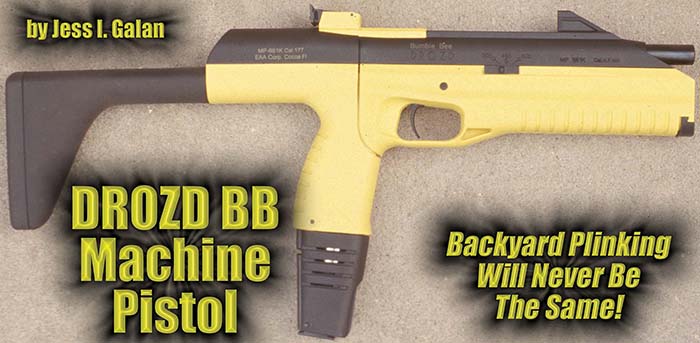The Baikal MP-661K Drozd is a revolutionary new CO2-powered BB gun capable of full-auto operation.
by Jess I. Galan
It had to happen sooner or later and it took the Russians to do it. As a matter of fact, the entire project seemed to be cloaked in secrecy at first, given the lack of solid information available during its initial stages. You would almost think that we were back in the Cold War days and that the project in question involved some deadly, super-secret weapon kept under tight wraps by the infamous KGB.
Late in 2002, however, well-known Russian gun manufacturer Baikal (Izhevsky Mekhanichesky Zavod) finally announced that their new MP-661K Drozd (small bird) CO2-powered BB machine pistol was in full production and ready for export. Indeed, the Baikal MP-661K Drozd was officially unveiled at the 2003 SHOT Show by its American importer and distributor, European American Armory Corporation (EAA), based in Sharpes, Florida.
There is little doubt that the MP-661K will do very well in the US market, as it is both a novel and fun gun that appeals to a wide cross-section of shooters. In fact, I dare say that even folks who don’t really consider themselves shooting enthusiasts, would be thrilled to plink away with this amazing little buzz gun.
At this point, let me dwell on a bit of history. Air- and gas-powered machine guns have been around for some time.
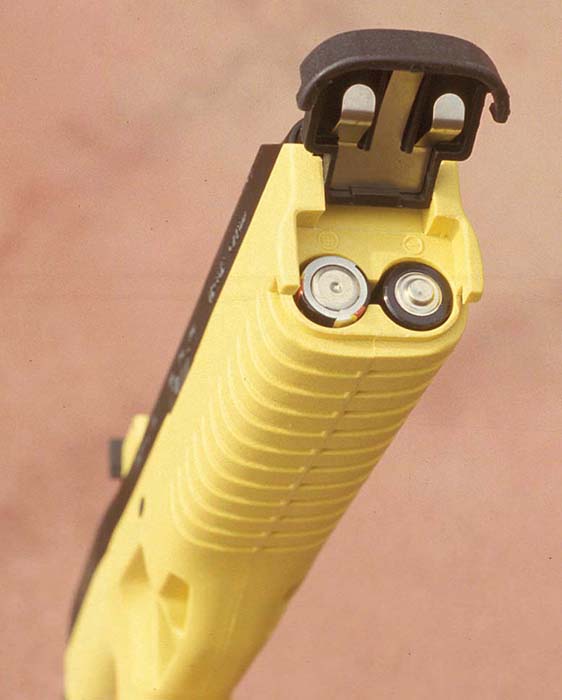
In the early days of World War II, some American companies produced BB-firing look-alikes of the .30 and .50 caliber Browning machine guns used by our armed forces. These air-powered BB machine guns were used by our military forces to train new recruits, quickly and inexpensively, in the basics of aerial gunnery. These trainers employed a car battery to operate the firing mechanism and shooting power was obtained from compressed air. The most well known of these wartime BB machine guns were the models made by the Mac Glashan Air Machine Gun Company in Long Beach, California.
In the mid-1970’s a small company called LARC, Inc., based in Miami, Florida, brought out a submachine-gun-sized full-auto BB gun powered by automotive-type Freon gas. The LARC M-19A – as this molded-plastic and aluminum BB gun was dubbed – was sold mostly by mail order and found a measure of popularity. However, its rather chancy reliability and feeble construction drove it out of the market after a few years.
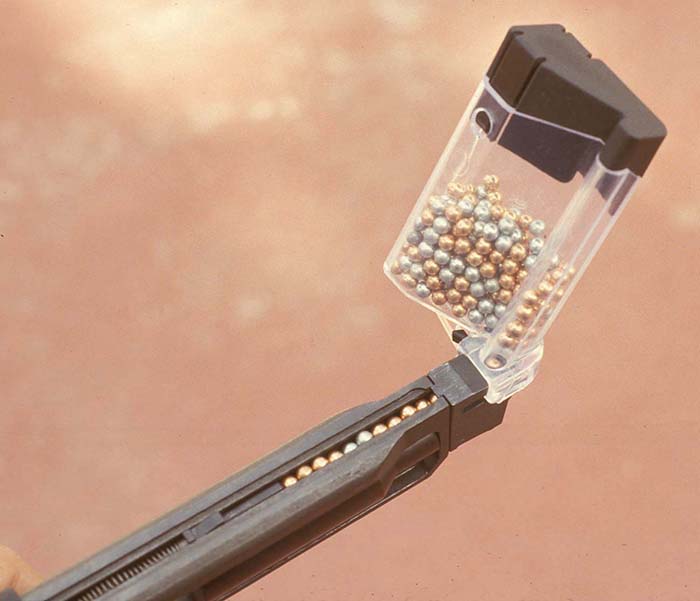
It should be noted that the MP-661K machine pistol, like all air- and CO2-powered guns, does not fall under any federal restrictions, despite the fact that it is capable of full automatic fire. Powered by a standard disposable 12-gram CO2 cylinder – of the type commonly used in most CO2 guns – this unusual BB gun also requires six regular AA alkaline batteries to operate its firing mechanism. The batteries go in the hollow forend, just below the barrel, and provide power to activate the striker that acts upon the CO2 valve located at the top of the detachable magazine. The small CO2 cylinder is housed in the magazine, and the latter has capacity for up to approximately 30 air gun BBs. Both standard steel BBs and 4.5 mm (.177 cal.) European lead BBs can be used in the Drozd.
The MP-661K measures 19 inches overall with its detachable molded shoulder stock installed, while removing it reduces the overall length to 13¾ inches. The buttstock fits snugly into dual recesses at the rear of the receiver and can be detached by simply giving it a sharp pull. Weighing a mere 3½ pounds, fully loaded and with its stock in place, this gun compares favorably in size and heft with several compact submachine guns and machine pistols meant for serious social affairs. With its shoulder stock removed, the MP-661K bears more than a passing resemblance to the Polish RAK PM-63 machine pistol.
The entire body and shoulder stock of the MP-661K are made of a tough looking molded synthetic and that’s okay with me. A bright yellow finish is given to the lower half of the piece, apparently in an effort to make it look toy-like and thus avert possible objections to its importation by US authorities though an early production sample received for tests late last year had an entirely black synthetic body. Current production has only the upper half of the gun’s body finished in black. Given this strange-looking color combination, EAA decided to rename the MP-661K, calling it “Bumble Bee.” Whether called “Little Bird” in Russian or “Bumble Bee” in English, the fact is that the MP-661K is one truly amazing fun gun. Surprisingly for a gun intended for shooting BBs only, the blued steel barrel of the MP-661K is rifled. The magazine assembly is also made of steel with a blued finish.
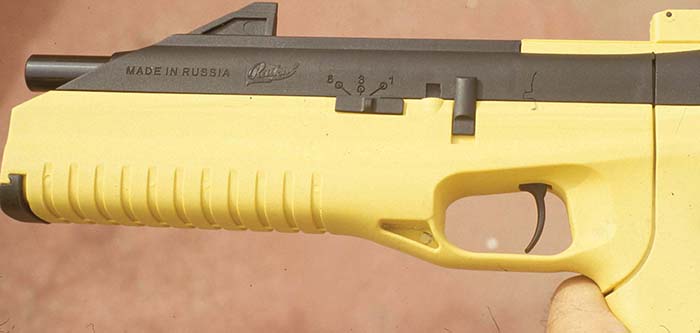
As far as fire controls, the MP-661K has the selector on its left side and it consists of a sliding catch capable of going to three positions clearly marked 1, 3, and 6. These indicate semiautomatic, 3-round burst, and 6-round burst, respectively. There is a similar sliding catch on the right side. This control allows the shooter to select the cyclic rate for burst fire, giving a choice of 300, 450, or 600 rpm.
The battery-operated firing mechanism is activated by a vertically sliding switch on the left side, about a half-inch behind the selector. When in the ON position, a red LED indicator light located just in front of this switch lets the shooter know that pulling the trigger will activate the firing mechanism. Thus, this switch is really the gun’s manual safety, because when it’s turned off, the MP-661K cannot fire even with a fully pressurized and loaded magazine in place.
For a BB plinker, the MP-661K has been given a decent set of sights. The rear unit comes with a fairly small square notch element and is fully adjustable via slotted screws. An aperture piece is also included with the gun in case the shooter prefers to use the gun with the stock attached. Up front there is a rather massive blade molded integrally with the upper receiver. The rear section of the latter sports a dovetail section that allows installation of a compact red-dot or laser-aiming device for special ops against mice and other small pests.
The MP-661K Drozd/Bumble Bee on test performed admirably. With a fresh 12-gram CO2 cylinder in place and fully loaded magazine, semiautomatic fire from the shoulder, at 20 feet, produced groups averaging 1 inch across. Not bad at all for a BB gun with a barrel measuring just over 8 inches. Despite its relatively short length of pull, the gun is well balanced and feels remarkably solid. Its single-stage trigger was creditably smooth and crisp on let-off.
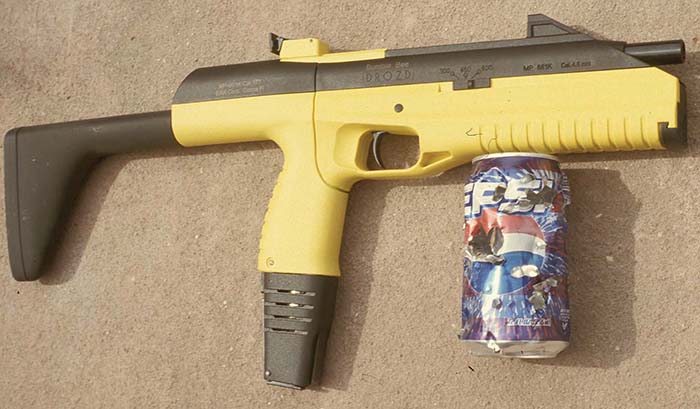
The muzzle velocity was chronographed, yielding an average of 332 fps, indicating that, compared to the vast majority of entry-level youth-grade BB guns; the MP-661K is a tad more potent. A dramatic demonstration of the gun’s power was given when it was turned loose on several empty soft drink cans set up about 20 feet downrange. With the switches set primarily on 6-round bursts at a cyclic rate of 600 rpm, the cans were quickly scattered and shredded with a few well-aimed bursts. Each 12-gram CO2 cylinder yields an average of 2½ to 3 full magazines before running dry.
Eye protection is a MUST when using this gun. Steel BBs rebound with significant force upon striking solid objects, and with this gun the chances of having a hail of BBs coming back at the shooter are obviously greatly increased.
Undoubtedly, the Baikal MP-661K adds a new dimension to backyard plinking with BB guns. Although definitely not in the toy category, despite its flashy color scheme, this unusual piece is “just what the doctor ordered” for folks longing for a bit of full-auto action that won’t break the bank and won’t require any BATF paperwork. My only advice to anyone buying one of these guns is to secure an ample supply of CO2 cylinders and BBs, because shooting this little chatterbox is truly addicting. Incidentally, the MP-661K comes with a handy device for quick-loading BBs into the magazine, a plastic bag containing approximately 200 BBs, plus spare O-ring seals and a clearly written instruction manual. Only one magazine is provided, but extra magazines can be purchased from the importer at reasonable cost.
| This article first appeared in Small Arms Review V7N11 (August 2004) |



